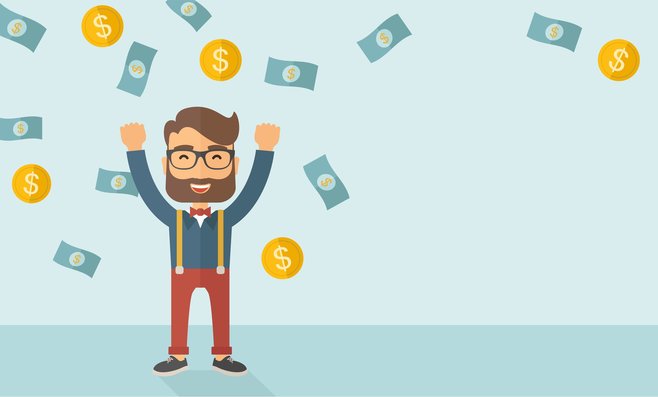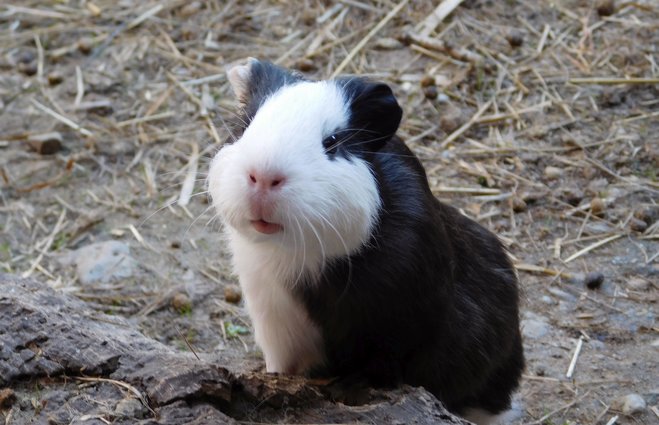Many of the nearly 2 billion Facebook users may have recently wondered about the new posts they were shown. What before was a colorful blend of friends, general information and hobbies is now (almost exclusively) featuring friends and family. It all sounds nice and social and it cleverly hides how Facebook is slowly increasing the pressure on other site owners. The goal: to make more money! Read on to learn why others have to pay so that you won't get bored.

I'd originally believed that Facebook's business model was obvious: selling ads and user data. Alas, that didn't generate enough revenue to gold-plate Mark Zuckerberg's country estate, sell 3 billion more gray t-shirts or whatever his big goals may be. That's why the one commodity that should be free is now getting (overly) expensive: content visibility! From now on, your timeline will no longer display the latest posts from friends and family at the top but also posts that have been paid for! The times when simply liking pages was enough to get frequent updates are over.
I'll give you a practical example: Nic, a talented photographer, who is fond of traveling follows his passion and displays his photos on Facebook. He enjoys roaming through lonely, abandoned places to take emotional shots. He's not making big money off it but simply wants to delight and share his impressions with others. His page "Die verlassenen Orte" (abandoned places) is highly likeable and he quickly gains a respectable fan following that anxiously awaits his next photos. Once he posts them, his fans are automatically notified in their timelines, it's a great system. Well it was, until Facebook apparently turned greed into an Olympic sport.
 A look at Facebook's headquarters
A look at Facebook's headquarters
First, Facebook actively reduces the visibility (the propagation) of a page - then brazenly offer its owner to improve that same visibility for a fee! It's like a towing service that first stabs your tires. That's why page owners now receive various "offers" that, for example, promise to help them reach 1200 more people for just $5. And if your ambitions are bigger - so are Facebook's pockets. Here's what that means: someone posts great content (wonderful photos) that increase the value of Facebook and then has to pay so that others can see them. That's like taking money from volunteers before allowing them to help. Nic is not a special case, it's not a flaw in the system since polls with over 3000 pages point to similar tendencies.
Of course, everything looks different from Facebook's point of view. It's algorithms, more secret than than the Coca Cola recipe, that help create the best possible user experience. Sounds great, right? It's all done for the user and in a noble and selfless fashion. The visibility of various pages is only lowered to keep users from drowning in "lesser" information and to focus their attention on important / relevant posts. Let's assume for a minute that this is true: won't users be eventually still drowning in all the paid posts Ihat now show up in their timelines or is that suddenly a different story? And why are small pages with 50 likes that only post photos of guinea pigs and certainly follow no other particular interests also affected? Why can’t I just carefully like the pages I wish to see more of in the future myself?
 Frequently underestimated: guinea pigs as an economic factor
Frequently underestimated: guinea pigs as an economic factor
Facebook obviously doesn't judge pages on a case by case basis. To be fair: Ashampoo also owns a well-maintained Facebook page, we use it to provide entertainment, ads and to stay in touch with you - it's OK if Facebook decides to ask for money. We're a company and we can freely decide whether we're willing to pay - which we won't since, to us, the price they're asking for is out of this world. Put in exaggerated terms, we might just as well send out mounted messengers that deliver lobster to you for the same amount. But why on earth would you want to ask money from the very people that, apart from personal interaction, contribute to the overall allure of Facebook in the first place?
Who'd willingly molest all the creative, diligent, witty and crazy characters out there that love to show us their ideas and projects? People that invest time, money and effort to make us marvel or smile time and again? Who'd demand money from small shops that maybe sell 3 crocheted potholders a month? If there's ever been an online presence that solely depends on the contributions and visits of its users it's Facebook. And many page owners have already given up once they noticed their pages are no longer visible to others. That's the moment when Facebook, while sitting on huge heaps of money, shoots itself in the foot.
Because Facebook would be so much more barren without these individuals, these tinkerers, these creators, these artists and photographers. If all you see in your timeline is friends, family, big companies and paid contents, things will get pretty lonely in the promised land. Facebook lovers will agree that, once reach and visibility become a commodity, the core principle behind Facebook is in danger. For now, monthly figures and turnover may be to Facebook's liking but it's all based on a single, delicate factor: user interest! If they keep on throwing spokes in the wheels of content producers, users may start to look elsewhere and move on to the next site. And Facebook will join places with Myspace, ICQ and many other bygone Internet giants.
Pic 1: Die verlassenen Orte (Abandoned places)
Pic 3: Sonja Stefan




I closed my FB account a while ago and don't miss it. I had pages that I 'liked' of interests I followed but I noticed years ago that they weren't showing. I'm not interested in all the crap that comes through and the "So true" comments. And, if I want to communicate with someone, I'll email or phone or whatever. I don't like to communicate in bits for all to see.
If all those account holders who are paying to have their stuff viewed just quit, I don't think it would take long for some change to be made. People do have the power; they just don't always use it.
I enjoy your articles. Thanks.
How many billions must these greedy little shits amass before there happy .
I really dislike Facebook and have left the site and d not go there. I think they ruined it several years ago . I am already gone and will not go back! Thanks for the update -- NO surprise1
Post is Excellent .Keep Visiting
I would like to say thanks for this wonderful information
It was bound to happen the minute the the huge amount was paid to the creators. Facebook had to recover that outlay.
I think you are right. Every social media app that tried the same tactic has died. All it will take is some bright spark to come up with something new and fresh and it will be goodbye Facebook. Personally I think the world will be relieved.
I serious doubt FarceBook's claim of 2 billion users. That number is as inflated as Zuckerbird's [sic] ego.
I never bought into the FarceBook idea. I still do not like the idea. And, now with further monetization, it is even less appealing.
The personal information and use habits belong to the individual users. FarceBook, if it collects anything, should have to pass the revenue on to the true owners of information.
It still is the world's largest hangout for pedophiles, abusers, perverts, con artists, scammers, thieves and criminals of all levels; and then there are the real dangerous people: every police agency in the world.
Moral: Under no circumstances use FarceBook. The world will be more safe.
Good point.
Have you read The Circle by Dave Eggars?
Your words almost describe the final days of MySpace. The site is a ghost town today. Other than using some very functional browser scripts what is the alternative to Facebook?
Have a great weekend Sven.
Excellent article Sven.
You're certainly not afraid of telling it like it is.
It's amazing to think that these companies think that they are too big to fail.
Corporate stupidity I suppose...or arrogance.
Makes me laugh when you see a post of someone suffering, someone dying or animal mistreatment , and they get hundreds of likes . Ugh !
I went on facebook when my nephew did but I didn't like the language he was using so I came off. I feel fine so I won't worry about it !!!!!
An elderly sage was addressing the fiscal council of an ancient kingdom. He stood before the king and said:-
“Sire, in eight words I will reveal to you the wisdom that I have distilled through all these years from all the writings of all the economists who once practiced their science in your kingdom. Here is my text:
“There ain’t no such thing as free lunch.”
My own interpretation goes something like this:-
"If someone makes you a free offer you can't refuse, you'd better believe that he's going to make money out of it somehow."
“Whole new theories of money were growing here like mushrooms: in the dark and based on bullsh*t.”
― Terry Pratchett :)
HI
I agree Greed will kill you in the end R.I.P. Facebook
The consumer ALWAYS gets to pay in the end!
I agree Sven, a great article, right to the point of something which was 'good medicine' for many has turned to 'poison'.
I used Facebook to visit a couple of 'tech' sites, Ashampoo and interstate relatives.
I am looking for alternatives after reading several articles relating to Mark Zuckerberg's skulduggery tactics to fill his pot with more gold.
Similar to our banks, people initially joined with a bank to keep their money and possessions in a safe place, and now, they, the boss cockies of the banks have turned against those people who were necessary to uphold the business, and are being used and abused with their own money, more taken away from them than given under the shifty banks' selfish rules and standards.
Zuckerberg with Facebook is facing what banks' don't have to fear, people leaving to find honest alternatives.
Let's hope Facebook sees sense.
I have never subscribed to Facebook or any other media site. Never will. Seems to me that these media sites are nothing more than a place to air your dirty laundry.
I was just starting to get use to it as it is/was!!
Thanks for the informative article as is usual. I'm just so glad I was around to experience the birth of the Web - remember when pages could be viewed on a slow connection without waiting for zillions of advertising links/metrics/whatever etc. to load?
The moral is that love of money eventually kills many of the good things. Hopefully it will do that to FB too.
I see a lot of posts featuring cancer stricken victims and sick children that someone has copied from elsewhere and added captions like "Her mother tells her no one loves her because she is crippled. If you don't share this post your are heartless." Will that kind of garbage, provided to increase visibility of dubious websites, be affected by this? If so, this fee to increase visibility might rid Facebook of this disgusting stuff.
I guess, if numbers start to drop they will want to lower the fees or the threshold that they become payable. However, shareholders, will not want to see revenue streams reduce so that may be tricky. The sort of greed you allude to, supported by effective monopoly power and the difficulty in retraining staff to use a new O.S. or software package, was/is Microsoft, and it did, indeed, hit them hard. In many respects it's a tax on creativity, and one that is easy to collect. Once set-up, I imagine it needs only minimal human input and maintenance, relative to volume and revenue through put. Not quite as easy as interest charges on money (the old sin of usury), but not that different.
Here in the U.K. as noted by a recent U.N. report we pay these types of organisation to run our Welfare system and healthcare provision. So if you need to contact a Welfare provider you are charged 45 pence a minute, while you wait on the line for on average at least 6 minutes listening to a benign piece of music, before being able ot speak to the advisor. Then, when connected to that advisor they are in no great hurry to resolve you enquiry, as they are on an incentive scheme to not pay out the monies your National Insurance has paid towards. I do hope the tyranny of the mega corporation service provider, of which Facebook is one, does not spread its avaricious grip across main land Europe. Hopefully, your electorates are too smart to let that happen and media too professional.
Always thought Facebook was a waste of time and you have confirmed it. Have never used it and never will.
"... And Facebook will join places with Myspace, ICQ and many other bygone Internet giants."
What goes up - must come down. And that starts to happen when (a) ordinary users see diminishing benefit in staying and (b) an alternative platform presents itself.
I already know that some of the photographers I follow have said "enough!" and migrated from FB to Ello. So, of course, people like me follow our interests to join them. I suppose that's the way it might start to happen ...